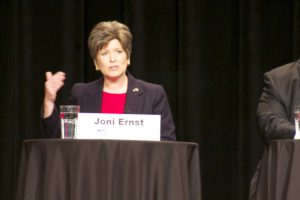If research from Dartmouth is any indicator, Joni Ernst may have already lost the Republican primary for U.S. Senate. In fact, she may never have had a chance.
The white paper, published this week, details how gendered facial cues can predict electoral success for female politicians. In other words, researchers wanted to determine if feminine appearance — especially facial cues of femininity — was correlated to success in political contests.

While research has shown political success for male candidates is linked to perceptions of competence and attractiveness, this white paper demonstrates gender cues uniquely predict a female candidate’s success beyond the other two perceptions. This suggests a gender disparity in the traits used to evaluate candidates.
“The findings suggest that gender-atypical female politicians may be deemed as less suitable for leadership, overall,” wrote the researchers. “In real-world elections, however … the weight afforded to gender typicality for electoral success persists only among those who more strongly value gender typicality: conservatives.”
In other words, the more conservative the voting block, the more likely a successful female politician was perceived as typical. A female politician who varied from perceptions of femininity — biologically and socially — signaled uncertainty, of which conservatives were specifically noted to be less tolerable.
Researchers tapped participants and ranked their home states by level of conservatism. Although Iowa was categorized as a state that leans liberal, the study considered the entire state. In the June 3 primary, only the state’s Republicans will participate on their ballot, skewing the audience to the right.
Facial features such as larger eyes and rounded features convey femininity while lateral bone growth and prominent upper brows signal masculinity, researchers wrote. Cultural cues such as makeup and long hair also contribute.
Ernst, the only female Republican stand-alone candidate on a statewide ballot, not only has an atypical appearance, but has taken significant strides to separate (by knife, if necessary) her candidacy from perceptions of femininity. Her first ad noted her ability to castrate hogs and how she will put the skill to use in Washington. The latest ad has Ernst in leather on a motorcycle while a voice-over states, “She’s not your typical candidate.” While the ad makes sure to identify Ernst in traditional roles — mom, grandmother — the thrust is “give her a shot” as Ernst pops caps in a paper target.
Her campaign has drawn many individual endorsements as well as two recent national group nods: the NRA and U.S. Chamber. The conservative wing of the Iowa GOP has, however, made its stand elsewhere. If asked, no doubt they would offer a litany of reasons for choosing another candidate. Could it be due to perceived separations from traditional femininity? Researchers would say so.
I believe there are factions within the GOP that remain unwilling to support any female politician. The fact that we have so few Republican women elected to office supports the notion of a general lack of support combined with a social cognitive rating system.
The good news for Ernst? If she can make it through the primary, the conservative bias she faces now will be much less prominent in the general.
This column by Lynda Waddington originally published in The Gazette on May 17, 2014. Photo credit: Alison Sullivan/The Gazette
